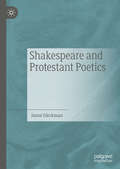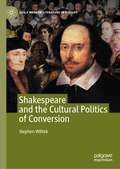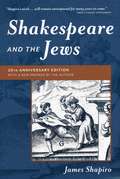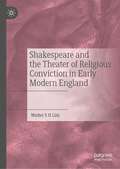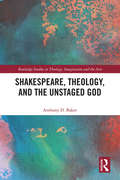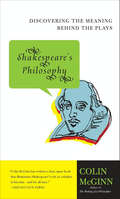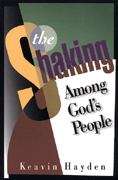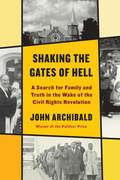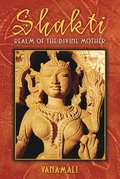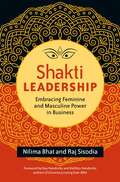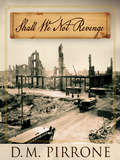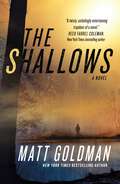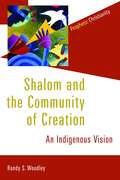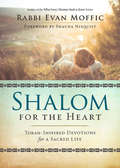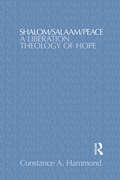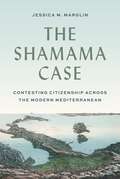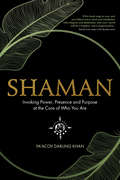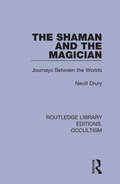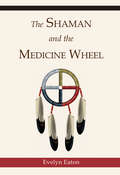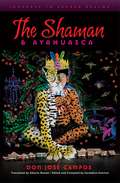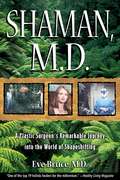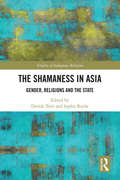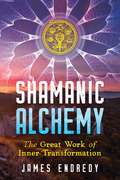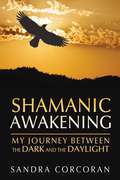- Table View
- List View
Shakespeare and Protestant Poetics
by Jason GleckmanThis book explores the impact of the sixteenth-century Reformation on the plays of William Shakespeare. Taking three fundamental Protestant concerns of the era – (double) predestination, conversion, and free will – it demonstrates how Protestant theologians, in England and elsewhere, re-imagined these longstanding Christian concepts from a specifically Protestant perspective. Shakespeare utilizes these insights to generate his distinctive view of human nature and the relationship between humans and God. Through in-depth readings of the Shakespeare comedies ‘The Merry Wives of Windsor’, ‘Much Ado About Nothing’, ‘A Midsummer Night’s Dream’, and ‘Twelfth Night’, the romance ‘A Winter’s Tale’, and the tragedies of ‘Macbeth’ and ‘Hamlet’, this book examines the results of almost a century of Protestant thought upon literary art.
Shakespeare and the Cultural Politics of Conversion (Early Modern Literature in History)
by Stephen WittekThis book takes a close look at Shakespeare’s engagement with the flurry of controversy and activity surrounding the concept of conversion in post-Reformation England. For playhouse audiences during the period, conversional thought encompassed a markedly diverse, fluid amalgamation of ideas, practices, and arguments centered on the means by which an individual could move from one category of identity to another. In an analysis that includes chapter-length readings of The Taming of the Shrew, Henry IV Part I, The Merchant of Venice, Othello, and The Tempest, the book argues that Shakespearean drama made a unique and substantive intervention in public discourse surrounding conversion, and continues to speak meaningfully about conversional experience for audiences in the present age. It will be of particular benefit to students and scholars with an interest in theatrical history, performance theory, theology, cultural studies, race studies, and gender studies.
Shakespeare and the Jews
by James ShapiroFirst published in 1996, James Shapiro's pathbreaking analysis of the portrayal of Jews in Elizabethan England challenged readers to recognize the significance of Jewish questions in Shakespeare's day. From accounts of Christians masquerading as Jews to fantasies of settling foreign Jews in Ireland, Shapiro's work delves deeply into the cultural insecurities of Elizabethans while illuminating Shakespeare's portrayal of Shylock in The Merchant of Venice. In a new preface, Shapiro reflects upon what he has learned about intolerance since the first publication of Shakespeare and the Jews.
Shakespeare and the Theater of Religious Conviction in Early Modern England
by Walter S LimThis book analyzes Shakespeare’s use of biblical allusions and evocation of doctrinal topics in Hamlet, Measure for Measure, The Winter’s Tale, Richard II, and The Merchant of Venice. It identifies references to theological and doctrinal commonplaces such as sin, grace, confession, damnation, and the Fall in these plays, affirming that Shakespeare’s literary imagination is very much influenced by his familiarity with the Bible and also with matters of church doctrine. This theological and doctrinal subject matter also derives its significance from genres as diverse as travel narratives, sermons, political treatises, and royal proclamations. This study looks at how Shakespeare’s deployment of religious topics interacts with ideas circulating via other cultural texts and genres in society. It also analyzes how religion enables Shakespeare’s engagement with cultural debates and political developments in England: absolutism and law; radical political theory; morality and law; and conceptions of nationhood.
Shakespeare, Theology, and the Unstaged God (Routledge Studies in Theology, Imagination and the Arts)
by Anthony D. BakerWhile many scholars in Shakespeare and Religious Studies assume a secularist viewpoint in their interpretation of Shakespeare’s works, there are others that allow for a theologically coherent reading. Located within the turn to religion in Shakespeare studies, this book goes beyond the claim that Shakespeare simply made artistic use of religious material in his drama. It argues that his plays inhabit a complex and rich theological atmosphere, individually, by genre and as a body of work. The book begins by acknowledging that a plot-controlling God figure, or even a consistent theological dogma, is largely absent in the plays of Shakespeare. However, it argues that this absence is not necessarily a sign of secularization, but functions in a theologically generative manner. It goes on to suggest that the plays reveal a consistent, if variant, attention to the theological possibility of a divine "presence" mediated through human wit, both in gracious and malicious forms. Without any prejudice for divine intervention, the plots actually gesture on many turns toward a hidden supernatural "actor", or God. Making bold claims about the artistic and theological of Shakespeare’s work, this book will be of interest to scholars of Theology and the Arts, Shakespeare and Literature more generally.
Shakespeare's Philosophy: Discovering the Meaning Behind the Plays
by Colin McGinnShakespeare’s plays are usually studied by literary scholars and historians and the books about him from those perspectives are legion. It is most unusual for a trained philosopher to give us his insight, as Colin McGinn does here, into six of Shakespeare’s greatest plays–A Midsummer Night’s Dream, Hamlet, Othello, Macbeth, King Lear, and The Tempest. In his brilliant commentary, McGinn explores Shakespeare’s philosophy of life and illustrates how he was influenced, for example, by the essays of Montaigne that were translated into English while Shakespeare was writing. In addition to chapters on the great plays, there are also essays on Shakespeare and gender and his plays from the aspects of psychology, ethics, and tragedy.As McGinn says about Shakespeare, “There is not a sentimental bone in his body. He has the curiosity of a scientist, the judgment of a philosopher, and the soul of a poet.” McGinn relates the ideas in the plays to the later philosophers such as David Hume and the modern commentaries of critics such as Harold Bloom. The book is an exhilarating reading experience, especially for students who are discovering the greatest writer in English.
The Shaking Among God's People
by Keavin HaydenA lay evangelist, Keavin Hayden is familiar with various divisional segments within Adventism and how they relate to the church. He is a strong advocate of unity between church leadership and laity for the completion of the preaching of the three angels' messages... [Hayden says] Ellen White told us that "the shaking must soon take place to purify the church" (Spiritual Gifts, vol. 2, p. 284). What did she mean by this statement? There seems to be confusion among Adventists regarding this issue. In this timely book Keavin Hayden examines what God has revealed to us about the shaking, answering such questions as: * When will the shaking take place? * Has it already started? * What is God's purpose in it? * Will a remnant come out of the organized church, or will God sanctify a remnant within it and by their faithful testimony purge the church from evil? * What tactics will Satan use to sift people out of the church?" * In what specific ways will the faithful be tested? * How can thorough reformation take place in our church? * How can we have assurance of victory?" Even if you are not a Seventh-Day Adventist, you will gain much by reading this book since Hayden discusses principles that apply to all Christian and Messianic-Jewish believers.
Shaking the Gates of Hell: A Search for Family and Truth in the Wake of the Civil Rights Revolution
by John ArchibaldOn growing up in the American South of the 1960s--an all-American white boy--son of a long line of Methodist preachers, in the midst of the civil rights revolution, and discovering the culpability of silence within the church. By the Pulitzer Prize-winning journalist and columnist for The Birmingham News." <P><P>My dad was a Methodist preacher and his dad was a Methodist preacher," writes John Archibald. "It goes all the way back on both sides of my family. When I am at my best, I think it comes from that sermon place." <P><P>Everything Archibald knows and believes about life is "refracted through the stained glass of the Southern church. It had everything to do with people. And fairness. And compassion." <P><P>In Shaking the Gates of Hell, Archibald asks: Can a good person remain silent in the face of discrimination and horror, and still be a good person? <P><P>Archibald had seen his father, the Rev. Robert L. Archibald, Jr., the son and grandson of Methodist preachers, as a moral authority, a moderate and a moderating force during the racial turbulence of the '60s, a loving and dependable parent, a forgiving and attentive minister, a man many Alabamians came to see as a saint. But was that enough? Even though Archibald grew up in Alabama in the heart of the civil rights movement, he could recall few words about racial rights or wrongs from his father's pulpit at a time the South seethed, and this began to haunt him. In this moving and powerful book, Archibald writes of his complex search, and of the conspiracy of silence his father faced in the South, in the Methodist Church and in the greater Christian church. Those who spoke too loudly were punished, or banished, or worse. Archibald's father was warned to guard his words on issues of race to protect his family, and he did. He spoke to his flock in the safety of parable, and trusted in the goodness of others, even when they earned none of it, rising through the ranks of the Methodist Church, and teaching his family lessons in kindness and humanity, and devotion to nature and the Earth. <P><P>Archibald writes of this difficult, at times uncomfortable, reckoning with his past in this unadorned, affecting book of growth and evolution.
Shakti: Realm of the Divine Mother
by VanamaliPresents the mystery of the Divine Mother in all her manifold aspects • Explores more than 30 different goddess aspects of the Shakti force, both beneficial and malefic • Includes Sanskrit hymns and classic verses by Sri Auribindo for each of the goddesses Shakti is synonymous with the Devi, the Divine Mother or divine power that manifests, sustains, and transforms the universe. She is the womb of all creatures, and it is through her that the One becomes the many. Our first and primary relationship to the world is through the mother, the source of love, security, and nourishment. Extending this relationship to worship of a cosmic being as mother was a natural step found not only in the Shakti cult of Hinduism but also in ancient Greek, Egyptian, and Babylonian cultures. Shakti presents more than 30 goddess incarnations of the Divine Mother that represent both the beneficial and malefic aspects of the Shakti force. From Lakshmi, Parvati, and Saraswati to Durga, Chandika, and Kali--each of the different functions of the female goddesses in the Hindu pantheon is revealed, accompanied by traditional Sanskrit hymns, classic verses by Sri Auribindo, and discussions of tantric philosophy. The author draws from the Devi Bhagavatham, which describes all the stories of Shakti, and the Devi Mahatmyam, the most powerful scriptural text that glorifies Shakti in her form as Durga. Using these texts she shows that through the power and grace of the Divine Mother we may be released from the darkness of ignorance and taken to the abode of knowledge, immortality, and bliss--the source from which we have come.
Shakti Leadership
by Nilima Bhat Raj SisodiaUnlocking the Source for True LeadershipToo many people, men and women alike, have bought into a notion of leadership that exclusively emphasizes traditionally "masculine" qualities: hierarchical, militaristic, win-at-all-costs. The result has been corruption, environmental degradation, social breakdown, stress, depression, and a host of other serious problems. Nilima Bhat and Raj Sisodia show us a more balanced way, an archetype of leadership that is generative, cooperative, creative, inclusive, and empathetic. While these are traditionally regarded as "feminine" qualities, we all have them. In the Indian yogic tradition they're symbolized by Shakti, the source that powers all life. Through exercises and inspirational examples, Bhat and Sisodia show how to access this infinite energy and lead with your whole self. Male or female, leaders who understand and practice Shakti Leadership act from a consciousness of life-giving caring, creativity, and sustainability to achieve self-mastery internally and be of selfless service to the world.
Shall We Not Revenge
by D. M. PirroneIn the harsh early winter months of 1872, while Chicago is still smoldering from the Great Fire, Irish Catholic detective Frank Hanley is assigned the case of a murdered Orthodox Jewish rabbi. His investigation proves difficult when the neighborhood's Yiddish-speaking residents, wary of outsiders, are reluctant to talk. But when the rabbi's headstrong daughter, Rivka, unexpectedly offers to help Hanley find her father's killer, the detective receives much more than the break he was looking for. Their pursuit of the truth draws Rivka and Hanley closer together and leads them to a relief organization run by the city's wealthy movers and shakers. Along the way, they uncover a web of political corruption, crooked cops, and well-buried ties to two notorious Irish thugs from Hanley's checkered past. Even after he is kicked off the case, stripped of his badge, and thrown in jail, Hanley refuses to quit. With a personal vendetta to settle for an innocent life lost, he is determined to expose a complicated criminal scheme, not only for his own sake, but for Rivka's as well. Finalist for the ForeWord Reviews IndieFab Awards in the Mystery category; named a Notable Book in the Page-Turners category by Shelf Unbound magazine. Pirrone "has painted a complex and intriguing portrait of her native Chicago, with a mix of crime, religion, and cultural division in a time of despair." -- Publishers Weekly ; This "deeply nuanced mystery is bolstered by fine writing and historical detail."-- Kirkus Reviews (starred review)
The Shallows: A Nils Shapiro Novel (Nils Shapiro #3)
by Matt GoldmanIn the words of Lee Child on Gone to Dust, “I want more of Nils Shapiro.” New York Times Best Selling author and Emmy Award-winning writer Matt Goldman obliges by bringing the Minneapolis private detective back for another thrilling, stand-alone adventure in The Shallows.A prominent lawyer is found dead, tied to his own dock by a fishing stringer through his jaw, and everyone wants private detective Nils Shapiro to protect them from suspicion: The unfaithful widow. Her artist boyfriend. The lawyer’s firm. A polarizing congressional candidate. A rudderless suburban police department. Even the FBI.Nils and his investigative partners illuminate a sticky web of secrets and deceit that draws national attention. But finding the web doesn’t prevent Nils from getting caught in it. Just when his safety is most in peril, his personal life takes an unexpected twist, facing its own snarl of surprise and deception.In The Shallows, Goldman delves into the threat of dark history repeating itself while delivering another page-turner with his signature pace, humor, and richly drawn characters.At the Publisher's request, this title is being sold without Digital Rights Management Software (DRM) applied.
Shalom and the Community of Creation: An Indigenous Vision (Prophetic Christianity Series (PC))
by Randy WoodleyMaterialism. Greed. Loneliness. A manic pace. Abuse of the natural world. Inequality. Injustice. War. The endemic problems facing America today are staggering. We need change and restoration. But where to begin? In Shalom and the Community of Creation Randy Woodley offers an answer: learn more about the Native American 'Harmony Way,' a concept that closely parallels biblical shalom. Doing so can bring reconciliation between Euro-Westerners and indigenous peoples, a new connectedness with the Creator and creation, an end to imperial warfare, the ability to live in the moment, justice, restoration -- and a more biblically authentic spirituality. Rooted in redemptive correction, this book calls for true partnership through the co-creation of new theological systems that foster wholeness and peace.
Shalom for the Heart: Torah-Inspired Devotions for a Sacred Life
by Shauna Niequist Evan MofficJewish dedication and commitment to studying Scripture is nothing short of inspiring. Jews have long been known as careful examiners of the Bible, dedicated to understanding and growing from God’s word. In traditional synagogues, the Torah is read three times per week, and each week, one of the Torah portions is examined. These encounters not only allow Jews to study God’s instruction for faith but also provide valuable inspiration for living that faith in the everyday. In Shalom for the Heart, popular author and speaker Rabbi Evan Moffic reveals the wisdom of the Torah for today’s Christians. Beautifully written weekly Torah-inspired devotions are offered to encourage readers throughout the year. Through his readings, Moffic invites Christians to engage in a study pattern of the Jewish founders of the faith, to grow deeper in relationship with Jesus, and find meaning, comfort, and direction for our lives. Endorsement: “Most Christians—myself certainly included—have so much to learn from the Jewish tradition and the study of the Torah, and from Judaism’s respect for the law and value on ritual and connection within their community. … This book is a gift for every Christian, anchoring us to a beautiful shared history that can deepen and enrich our understanding and our faith.” ~ Shauna Niequist, best-selling author and speaker
Shalom/Salaam/Peace: A Liberation Theology of Hope
by Constance A. HammondConflict between the Israelis and the Palestinians has been ongoing since the creation of the state of Israel, a conflict revolving around land-ownership, water politics, human rights, and religious rights. 'Shalom/Salaam/Peace' examines the realities of life in contemporary Israel/Palestine, with its politics, wars, security wall, settlements and ongoing struggles. Having established the historical, scriptural and theological context behind the present situation, the book presents key figures who have promoted peace and justice and explores liberation theology as a way of bringing peace in Israel/Palestine. Combining the history of liberation theology with its lived reality in Israel/Palestine today, 'Shalom/Salaam/Peace' is an illuminating resource for students and scholars of politics and religion.
The Shamama Case: Contesting Citizenship across the Modern Mediterranean
by Jessica MarglinHow a nineteenth-century lawsuit over the estate of a wealthy Tunisian Jew shines new light on the history of belongingIn the winter of 1873, Nissim Shamama, a wealthy Jew from Tunisia, died suddenly in his palazzo in Livorno, Italy. His passing initiated a fierce lawsuit over his large estate. Before Shamama's riches could be disbursed among his aspiring heirs, Italian courts had to decide which law to apply to his estate—a matter that depended on his nationality. Was he an Italian citizen? A subject of the Bey of Tunis? Had he become stateless? Or was his Jewishness also his nationality? Tracing a decade-long legal battle involving Jews, Muslims, and Christians from both sides of the Mediterranean, The Shamama Case offers a riveting history of citizenship across regional, cultural, and political borders.On its face, the crux of the lawsuit seemed simple: To which state did Shamama belong when he died? But the case produced hundreds of pages in legal briefs and thousands of dollars in lawyers’ fees before the man's estate could be distributed among his quarrelsome heirs. Jessica Marglin follows the unfolding of events, from Shamama's rise to power in Tunis and his self-imposed exile in France, to his untimely death in Livorno and the clashing visions of nationality advanced during the lawsuit. Marglin brings to life a Dickensian array of individuals involved in the case: family members who hoped to inherit the estate; Tunisian government officials; an Algerian Jewish fixer; rabbis in Palestine, Tunisia, and Livorno; and some of Italy’s most famous legal minds.Drawing from a wealth of correspondence, legal briefs, rabbinic opinions, and court rulings, The Shamama Case reimagines how we think about Jews, the Mediterranean, and belonging in the nineteenth century.
Shaman: Invoking Power, Presence and Purpose at the Core of Who You Are
by Ya'Acov Darling KhanGuidebook blending experiences of shamanic teacher with transformational exercises and rituals designed to bring shamanism into the 21st century.A shaman is someone who reminds us of the rhythm of life that is dancing inside us and invites us to follow it, who shows us how we can dream a better world into being. Shamans are no longer isolated healers in faraway places. Their spirit has returned and is infusing the work of teachers, artists and activists, leaders in business and people throughout all areas of our societies.We all have an inner shaman and this book is for you if you: • recognize there's untapped power inside you that you want to learn how to harness • want to feel a deeper connection to your own nature, your ancestors, your community and the intelligence of life itself • care about the future of life on our planet and wish to redress the balance between humanity and nature • know your purpose is to co-create a world that is built on justice and sustainability There is a shaman in you who was born to play a powerful role in our collective awakening for our future on Earth.
The Shaman and the Magician: Journeys Between the Worlds (Routledge Library Editions: Occultism #1)
by Nevill DruryOriginally published in 1982, The Shaman and the Magician draws on the author’s wide experience of occultism, western magic and anthropological knowledge of shamanism, to explore the interesting parallels between traditional shamanism and the more visionary aspects of magic in modern western society. In both cases, as the author shows, the magician encounters profound god-energies of the spirit, and it is up to the individual to interpret these experiences in psychological or mythological terms. The book demonstrates that both shamanism and magic offer techniques of approaching the visionary sources of our culture.
The Shaman and the Medicine Wheel (Quest Bks.)
by Evelyn Eaton"The more we meditate on the Medicine Wheel and on the Cosmic Wheel above, relating these to the circles, spheres, and mandalas of other traditions, the deeper our realization grows of the oneness of the many paths leading to the Center." Although Evelyn Eaton walked principally the Native Indian path, this book reflects her belief in the strength and beauty of all religious traditions. This is the personal account of her triumph over cancer through Native American healing rituals. Of white and Native American ancestry, Eaton was a Metis Medicine Woman.
The Shaman & Ayahuasca: Journeys To Sacred Realms
by Geraldine Overton-Wiese Don Jose CamposMore and more Ayahuasca has come to the attention of the Western media.<P><P> Used by the shamans of Peru , the rituals and practices around this psychoactive plant-based brew date back 50-70,000 years as evidenced by rock and cave paintings found the world over. Through their use of Ayahuasca, Shamans establish contact with the spirit world which they call upon to aid them in their healing practices, understanding of the cosmos, and how to live well in the world.In The Shaman & Ayahuasca, internationally respected Peruvian shaman Don Jose´ Campos illuminates the practices and benefits of Ayahuasca with grace and gentleness, while expressing respect and gratitude for the gifts Ayahuasca has bestowed on him throughout the 25 years he has been a practicing shaman. He takes the reader on a journey through his own discovery of other worlds, other dimensions, 'alien' entities and 'plant teachers.' The Shaman & Ayahuasca gives an overview of an entire cosmology with the potential to benefit all of mankind. It is the perfect book to introduce readers to the profound experiences of Ayahuasca.
Shaman, M.D.: A Plastic Surgeon's Remarkable Journey into the World of Shapeshifting
by Eve BruceA highly successful plastic surgeon embraces shamanic healing techniques and helps her patients experience true beauty and ecstasy.• The author has been featured by Healthy Living magazine as one of the top 19 holistic healers for the millennium.• Shows readers how to embody the spiritual within the physical to shapeshift their lives on all levels.• Both an exceptional personal journey and an extraordinary exploration of the nature of real healing.As a dual board-certified plastic and reconstructive surgeon and the first non-Quechua woman to be initiated into the Circle of Yachaks (bird-people shamans of the Andes), Dr. Eve Bruce sees herself as an agent of change in both worlds. After traveling to Central and South America to study indigenous healing techniques, Bruce realized that although our culture is obsessed with narrowly defined standards of physical beauty, we actually devalue the physical because we separate it from the spiritual. She saw that her plastic surgery patients who felt ashamed of their "vanity" had the least successful outcomes. Those ready for change on emotional and spiritual levels were able to use the physical "shapeshift" provided by the surgeon's knife to transform their entire lives. By integrating the two healing modalities of surgeon and shaman, Bruce is able to help people shapeshift into newfound health on all levels--physical, emotional, and spiritual. Because she bore her first child at sixteen, rose to the challenges of single motherhood, and worked her way through medical school, Bruce learned early to redirect the flow of her life, turning apparent obstacles into opportunities. As a powerful example of the human capacity for self-transformation, Bruce is uniquely qualified to inspire readers to redirect their own lives to places of beauty and self-acceptance.
The Shamaness in Asia: Gender, Religion and the State (Vitality of Indigenous Religions)
by Davide Torri; Sophie RocheThis book concentrates on female shamanisms in Asia and their relationship with the state and other religions, offering a perspective on gender and shamanism that has often been neglected in previous accounts. An international range of contributors cover a broad geographical scope, ranging from Siberia to South Asia, and Iran to Japan. Several key themes are considered, including the role of bureaucratic established religions in integrating, challenging and fighting shamanic practices, the position of women within shamaniccomplexes, and perceptions of the body,. Beginning with a chapter that places the shamaness at the centre of the discussion, chapters then approach these issues in a variety of ways, from historically informed accounts, to presenting the findings of extensive ethnographic research by the authors themselves. Offering an important counterbalance to male dominated accounts of shamanism, this book will be of great interest to scholars of Indigenous Peoples across Religious Studies, Anthropology, Asian Studies, and Gender Studies.
Shamanic Alchemy: The Great Work of Inner Transformation
by James EndredyA hands-on guide to advanced spiritual transformation through the combined sacred arts of alchemy and shamanism • Recasts the 7 stages of the alchemical “Great Work” as a transformative shamanic journey and initiatic experience • Provides step-by-step instructions for 18 shamanic alchemy practices for inner transformation, including vibrational energy work, consciousness-altering techniques, the creation of mirrors of the mind, and sacred ceremonies tied to the four elements • Explores the alchemical plant-medicine techniques of spagyrics, as well as recipes for basic tinctures and “plant-stones” Offering a unique, hands-on guide to advanced self-transformation, James Endredy shows how traditional shamanic techniques offer a doorway into the sacred art of alchemy, the inner transformation of the soul. Revealing the practical and intuitive connections between shamanism and alchemy, including not only Western alchemy but also alchemical practices from the East, Endredy recasts the 7 stages of the alchemical “Great Work” as a transformative shamanic journey and initiatic experience. He provides step-by-step instructions for 18 shamanic alchemy practices for inner transformation, including vibrational energy work, consciousness-altering techniques, the creation of mirrors of the mind, shamanic viewing, and sacred ceremonies tied to the four elements. Exploring the healing art of spagyrics, the author shows how this alchemical plant-medicine practice is receptive to the energetic work of traditional shamanic techniques. He details formulations for distilling shamanic spagyric remedies, as well as recipes for basic tinctures and “plant-stones.” He also discusses the creation of sacred space, altars, and shamanic distillation lodges. Comparing shamanic and alchemical cosmologies, the author explains how both shamanism and alchemy employ direct experience of the numinous and invisible worlds, also known as gnosis, to impart wisdom, invoke peace of mind, and increase creativity and vitality. Showing how the practical vibrational science of alchemy and the consciousness-transforming techniques of shamanism directly enhance and expand upon each other, Endredy also reveals how they have the same ultimate goals: to allow the practitioner to transmute spiritual lead into gold and to penetrate the deep secrets of life and of nature.
Shamanic Awakening: My Journey between the Dark and the Daylight
by Sandra CorcoranOne woman’s mystical path through grief into renewal, expanded awareness, and discovery of her own healing capabilities • Offers a lens into a wide variety of wisdomkeeping traditions and alternative healing paradigms throughout the Americas and Europe • Shows how the mystical path enables us to find renewal in times of profound loss • Details the author’s awakening to the energies of the cosmos, which can guide us toward our destiny, balanced between our soul’s dark and light energies How do you find renewal after loss, especially the loss of a child? How do you find purpose and courage when loss is your constant teacher? After weeks of profound grief following the loss of her young daughter, Sandra Corcoran found herself inexplicably at a life-changing workshop on indigenous teachings and energy healing. With the first glimpse of the light that called her to the workshop, Corcoran found herself beginning a 30-year metaphysical journey within, initially to heal her grief but eventually leading her from the darkness into the light of her own soul’s evolution. Working with Native elders and indigenous wisdomkeepers throughout North, Central, and South America, Corcoran opened her heart to the immensity of the living energies of the cosmos and discovered her shamanistic gifts as an intuitive counselor, dreamtime decoder, and facilitator for others’ self-healing. As she learned to discern these living energies and work with them, she also discovered the middle path between the soul’s dark and luminous energies, striking the balance that allows us to fulfill our destiny. Sharing the core teachings of her many indigenous and esoteric mentors, including lessons in synchronicity, metaphysics, the extraordinary power of the heart, multi-dimensional realms, and energy healing, Corcoran leads readers on an adventure across continents through birth, death, ceremony, and ritual to renewal and the frontiers of expanded consciousness. She shows that no matter how far outside of the familiar we are led, we are guided back to ourselves and offered another opportunity to embrace our world and, ultimately, find our place in it.
